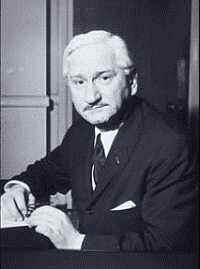
Albert Sabin
(1906 - 1993)
Drs. Jonas E. Salk and Albert B. Sabin were the pioneers and researchers who discovered the vaccine and serum to combat polio, a crippling and killing disease that affected millions of people throughout the world annually.
Sabin was born in Bialystok, Poland, on August 26, 1906, one of four children of Tillie and Jacob Sabin. The family came to America in 1921, settling in Paterson, New Jersey, where Sabin's father was in the silk and manufacturing business. Early in his career, Sabin, who received his medical degree from New York University in 1931, became interested in polio. Many of his experiments on polio virus research were reported to the National Foundation of Infantile Paralysis.
During World War II, he served in the U.S. Army Medical Corps, where he was involved with the development of a vaccine against dengue fever and the successful vaccination of 65,000 military personnel against the Japanese type of polio.
After the war, Sabin continued his research on polio. He developed a vaccine that used live virus; Salk's vaccine used dead virus. Salk's new vaccine had one drawback: booster injections had to be given periodically. Sabin, meanwhile, had been conducting experiments on obtaining a live polio virus pill to be taken orally since 1952. In 1955, he conducted experiments with prisoners who had volunteered.
Sabin and his associates took the oral live viruses before conducting experiments on select groups of people form 1955 to 1957. During this period, Salk's vaccine was in use, but many virologists throughout the world believed Sabin had a superior vaccine.
From 1957 to 1959, the U.S.S.R. and the other Eastern Bloc nations gave the oral vaccine, with its advantages of oral administration and long-term immunity, to millions of children and adults. Finally, Sabin's vaccine was used in the United States. Sabin died on March 3, 1993.
Courtesy of:
http://www.jewishvirtuallibrary.org/jsource/biography/Sabin.html
